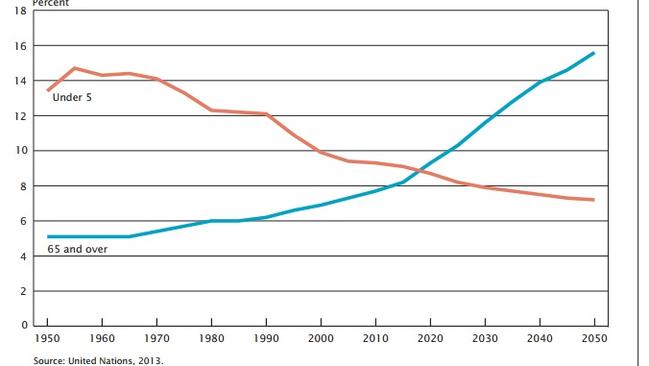The ‘crossing’ will see old people to outnumber children for the first time before 2020
BEFORE the end of the decade, the world will experience an unprecedented “crossing” event that will forever change our societies.

BEFORE the end of the decade, the world will experience an unprecedented “crossing” event.
For the first time in human history, there will be more elderly people than young children in the global population, Business Insider reports.
Specifically, just before the year 2020, adults aged 65 and over will begin to outnumber children under the age of five, according to a recent report by the US Census Bureau.
According to the report, by 2050 people aged 65 and over will make up 15.6 per cent of the global population, more than double young children, who will make up 7.2 per cent.
“These two age groups will then continue to grow in opposite directions,” the report notes. “This unique demographic phenomenon of the crossing is unprecedented.”
A commonly used indicator for the speed of population ageing is the number of years it takes for the older population to double from seven per cent to 14 per cent, and again from 14 per cent to 21 per cent.
In Australia, it took 73 years for the “doubling” to occur in 2014. The “tripling” will only take another 26 years, occurring in 2037, according to the US Census Bureau report.
While Europe will remain the oldest region through to 2050, the report notes that the size of Asia’s population and the speed of ageing means the total size of its older population will dwarf other regions.

By 2050, there will be nearly one billion people aged 65 and over in Asia, making up just under 20 per cent of the total regional population.
Africa, meanwhile, is “exceptionally young” and will remain so in the foreseeable future. By 2050, just 6.7 per cent of its population, or 150.5 million, will be elderly.
In a research note expanding on the Census Bureau report, a team of researchers from Bank of America Merrill Lynch led by Beijia Ma described the phenomenon as “peak youth”.
“We are living in the midst of the most remarkable demographic transition in history,” they wrote, pointing out life expectancy would reach 77.1 years by 2050 versus 48 years in 1950.
The global population aged over 60 will grow to 2.1 billion by 2050 compared with 901 million today, the median age worldwide will hit 36 compared with 29.6, and life expectancy is increasing by one year every five years.
“We are arriving at ‘peak youth’ for the first time in human history with the number of persons aged 65+ expected to outnumber children under five by the end of this decade,” they wrote.
“Ageing has also become a universal phenomenon, and by 2050, 80 per cent of older people will live in [emerging markets]. Life expectancies of 300 to 400 years or even an infinite extension of life expectancy may be within reach in our lifetimes.”




